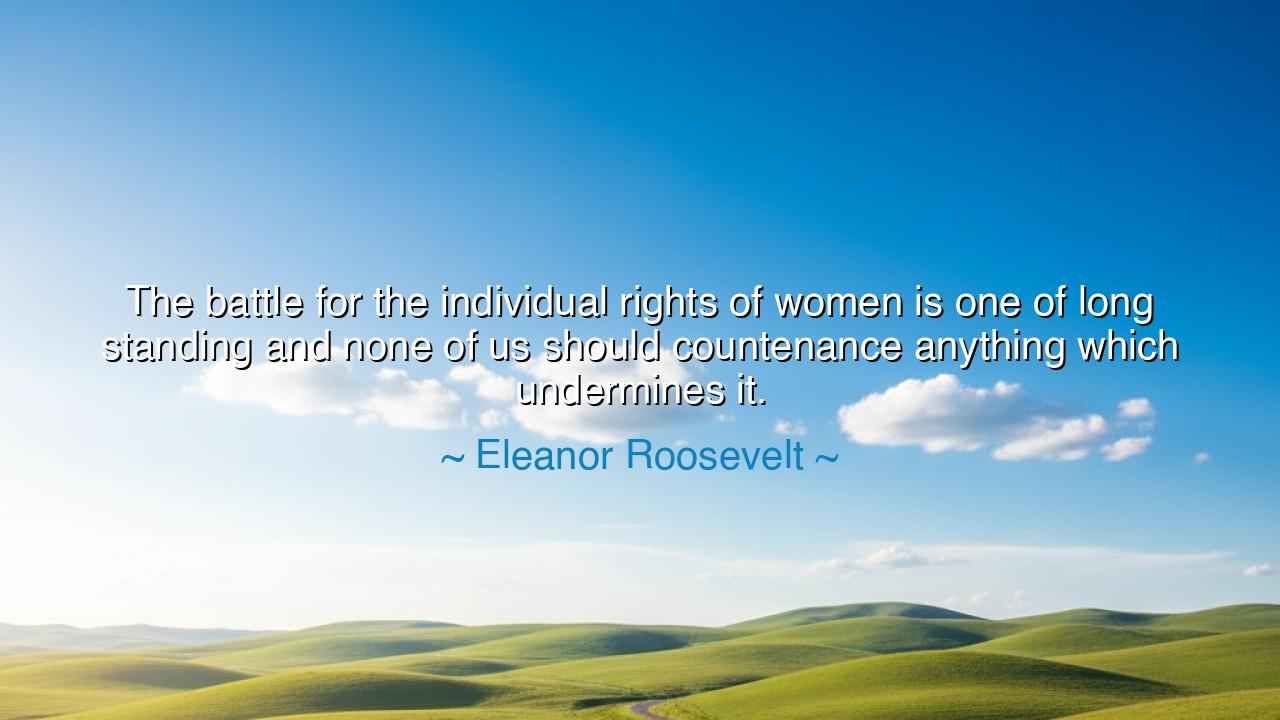
The battle for the individual rights of women is one of long
The battle for the individual rights of women is one of long standing and none of us should countenance anything which undermines it.






Hear, O children of freedom, the steadfast words of Eleanor Roosevelt: “The battle for the individual rights of women is one of long standing and none of us should countenance anything which undermines it.” In this utterance, she calls all generations to vigilance. For the struggle for women’s rights is not a momentary campaign but an enduring war, fought through centuries of silence, dismissal, and denial. It is a battle that began long before her voice rose and one that must continue until justice is complete.
For Roosevelt, who walked among the broken of the Great Depression and spoke to the weary in times of war, saw with clarity that rights once gained are never safe unless guarded. The individual rights of women—to vote, to work, to speak, to live free of oppression—were won through sacrifice. Yet she warns that what is won can also be lost if people grow complacent, if they allow the creeping shadow of inequality to return.
History proves her wisdom. Recall the long fight for suffrage: women like Susan B. Anthony, Alice Paul, and countless unnamed stood in the streets, endured prison, hunger strikes, and scorn, until at last the right to vote was written into law. But Roosevelt reminds us: the passing of a law is not the end of the struggle. For even after suffrage, women were still denied equal pay, still silenced in boardrooms, still treated as less. The battle endured, and still endures.
Consider too the struggle for civil rights, where Black women bore a double burden—fighting both racism and sexism. Leaders like Fannie Lou Hamer showed that the fight for women’s rights is inseparable from the fight for human rights. Roosevelt’s words echo here: to undermine even one woman’s rights is to undermine the rights of all, for justice cannot be divided without being destroyed.
Therefore, O seekers of wisdom, let this be your teaching: never turn away when the rights of women are diminished, for silence in the face of injustice is betrayal. The battle for women’s rights is a torch passed from hand to hand through generations, and to let it fall is to dishonor all who carried it before. Roosevelt’s voice thunders through the ages: countenance no retreat, endure no undermining, for the freedom of women is the measure of the freedom of all.






NNLe Na Nguyen
Eleanor Roosevelt’s quote is a powerful reminder that women’s rights are not guaranteed by any means and that they are continually under threat. How do we keep pushing for progress without becoming complacent? It seems that as soon as one issue is resolved, new challenges arise. What can we do to ensure that the work being done today continues to build a stronger, more equitable future for women everywhere?
MTNguyen thi minh thu
Roosevelt’s recognition of the long-standing battle for women’s rights is crucial. It highlights the need for persistence, but also makes me reflect on how far we’ve come and how much further we need to go. In what ways can we foster a culture where the rights of women are universally respected, and not just periodically defended? Can we create systems that ensure that women’s rights are never again at risk of being undermined?
BBach
Eleanor Roosevelt’s words feel as relevant today as ever. The struggle for women’s rights has not ended, and it’s crucial that we remain vigilant against efforts to undermine those rights. But I wonder, how can we encourage everyone, not just women, to be allies in this fight? The battle for equality is not one that can be won by half of the population alone, and solidarity is key.
PTMai Phuong Thúy
I completely agree with Roosevelt’s assertion that the fight for women’s rights is ongoing. It’s a battle that has been fought for centuries, yet we still see frequent attacks on women’s autonomy. How can we stand against these setbacks without losing hope? What actions can we take to ensure women’s rights are not just a historical achievement but a lasting, secure aspect of society?
VNHanh Tien Vo Ngoc
Roosevelt’s message is a reminder of how essential it is to protect women’s rights and not take them for granted. But the question remains: Are we truly living in a world where women’s rights are secure? Even today, women’s autonomy over their bodies, careers, and personal lives is still being challenged. How can we ensure that the progress made over the years is safeguarded for future generations of women?